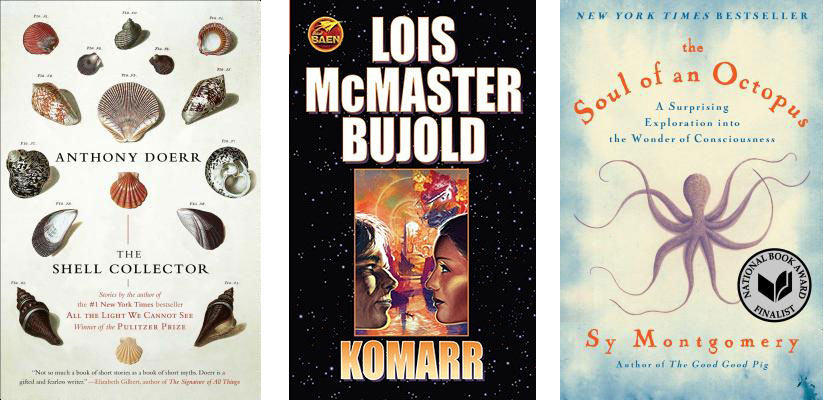Whatcha Reading, Paige Embry?
Every week we ask an interesting figure what they're digging into. Have ideas who we should reach out to? Let it fly: info@seattlereviewofbooks.com. Want to read more? Check out the archives.
Paige Embry is the Seattle-based author of the new book Our Native Bees: North Ameria's Endangered Pollinators and the Fight To Save Them. She'll be appearing next Friday, March 2nd, at The Elliott Bay Book Company to talk about bees, her book, and her journey from geologist, to gardener, to bee expert.

What are you reading now?
I’m reading Anthony Doerr’s collection of short stories, The Shell Collector. I’ve only just begun but find myself entranced by the title story, sucked in by the lure of the unfamiliar: the location in East Africa, the idea of being a blind shell collector and most of all, the exotic shells themselves and the creatures that inhabit them. As a writer, I read some of Doerr’s descriptions with awe and a little envy. On one page I find “a crab-guarded socket in the coral” and “a tiny tessellated cone.” Tessellated — what a delightful word. It is perfectly descriptive, has a pleasing sound and is also a little bit exotic—not a word commonly used in every day conversation. In short, I’m finding the first story in this collection a pleasure on many levels and I’m looking forward to seeing how the other stories compare.
What did you read last?
I like to re-read books, and when I’m under the weather I almost always pull out some old faithful. The books I choose in this situation aren’t mentally challenging, not even on the first read. What they all have is a character, or a group of characters, that I like and a world that is a respite to sink into.
The book that I turned to for this latest bout of illness was Komarr, part of a sci-fi series written by Lois McMaster Bujold. Komarr is toward the end of a series of about ten books based on a male character, Miles Vorkosigan. In the first book he’s 17 or 18 and in the last book I read he’s pushing 40. He lives in a world where humans have spread from Earth to inhabit many planets but there are no other sentient beings. The ethos of the planets varies. One, for example, is uber-liberal — a kind of Scandinavia on steroids. Miles’s planet is authoritarian, militaristic and unforgiving of mutations. Miles is smart and the son of a powerful man but he was damaged in utero and so is only 4’9”. He’s got a chip on his shoulder and over the course of the series you get to watch him grow up and deal with his reality. The stories are enjoyable, some of the side characters are well-developed and I like Miles. He and his world are a comforting place to go visit when I’m feeling ill.
What are you reading next?
For Christmas I bought my husband The Soul of the Octopus: A Surprising Exploration into the Wonder of Consciousness by Sy Montgomery. I usually try and buy him a book (or books) that seem just perfect for him. I confess that I bought this one knowing he’d likely enjoy it but if he didn’t—oh well, I certainly wanted to read it. Learning about octopuses (apparently it is octopuses and not octopi because octopus is derived from Greek, and you don’t plunk Latin endings onto Greek-derived words) would be a good enough reason for me to take a look at this book but I’m also interested to see the author’s approach to the subject since she didn’t start out as an octopus expert. She developed an interest and then threw herself into research — I can relate to that — and I’m looking forward to seeing how she handles it.